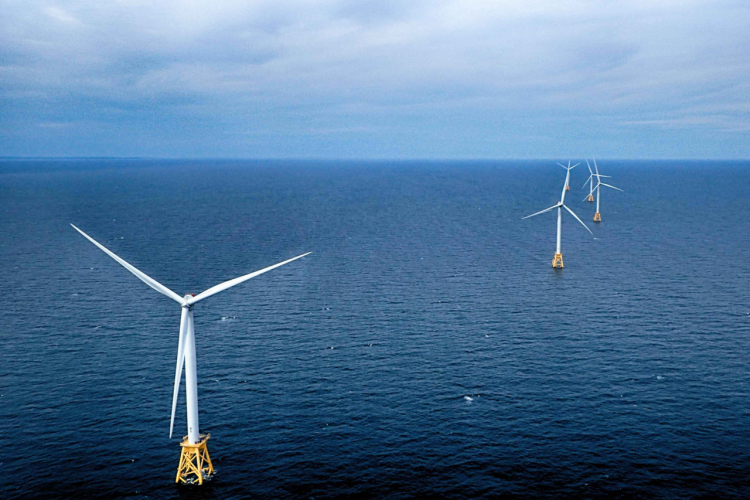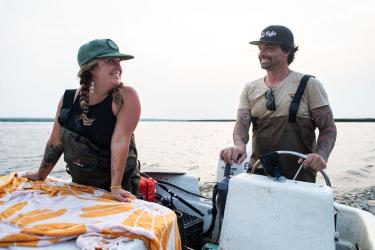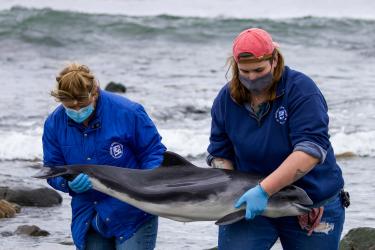NOAA’s Role
The Bureau of Ocean Energy Management (BOEM) is the lead federal agency for offshore energy exploration and development. NOAA Fisheries is the lead federal agency charged with stewardship of marine life. Building, operating, and decommissioning offshore wind power plants affects a number of our key mission areas, including: fisheries, protected animals (such as sea turtles and whales), seabirds, and marine habitats. We provide information to help the Bureau of Ocean Energy Management make informed decisions about offshore wind energy development and operations. Specifically, we:
- Provide data and analyses related to fishing activities, ocean conditions, and affected marine resources.
- Provide input and review throughout the regulatory process, working as a cooperating agency to assist BOEM in their development of an environmental impact statement under the National Environmental Policy Act.
- Conduct research and monitoring to better understand the potential effects of offshore wind energy development on marine habitats, fisheries, protected resources, and their ecosystems.
- Providing BOEM, other federal agencies, states, tribes, and stakeholders with information on fisheries operations and the potential socioeconomic impacts of offshore wind projects on fishing communities.
- Foster management decisions that promote coexistence among competing uses while minimizing adverse impacts to our trust resources.
Regulatory Authority for NOAA Involvement
We work with the BOEM, other federal and state agencies, and stakeholders to assess and how offshore wind projects affect endangered or threatened species, marine mammals, fisheries, marine habitats, and fishing communities and work to protect these important resources. Our authorities derive from:
- Endangered Species Act
- Marine Mammal Protection Act
- Magnuson-Stevens Fisheries Conservation and Management Act
NOAA Fisheries New England/Mid-Atlantic Regional Activities
NOAA Fisheries provides expertise and advice to regulators, developers, and stakeholders as we work toward a more diverse energy future. To ensure we are prepared, we have established an internal wind energy team. It’s their job to coordinate resources, participation, and communications on wind energy development issues among NOAA staff and our collaborators. To leverage our capacity for addressing wind energy development, we are working with partners including:
- Regional fishery management councils and commission
- Responsible Offshore Development Alliance
- Responsible Offshore Science Alliance
- International Council for Exploration of the Sea’s Working Group on Offshore Wind Development and Fisheries
- Regional Wildlife Science Collaborative for Offshore Wind
We have initiated scientific work in several study areas that will help support decision making:
Biology and Ecology
- Tracking spawning Atlantic cod and other commercial fish species along the Southern New England wind energy areas using underwater acoustic technology.
- Studying how black sea bass respond to offshore wind pile driving and other marine construction noise at different life stages
- Building an area-specific habitat database
- Forage fish in offshore wind energy areas
Fisheries
- Investigating how fish populations react to offshore wind turbine installation and related construction activities
- Summarizing fishing activity within each offshore wind lease or project area along the U.S. Atlantic Coast
- Using fine-scale fishery data to evaluate and predict the potential impact of offshore wind energy development on fishery operations
- Analyzing affected commercial and recreational fishing activity to make economic impact information available to planners, developers, and regulators
Marine Mammals, Sea Birds, Sea Turtles
- Evaluating marine habitat use by these animals off the East Coast with particular emphasis on wind lease areas
Technical Guidance for Offshore Wind Energy Projects in the Greater Atlantic Region
- Resources for action agencies to help with their analysis of the effects of proposed offshore wind projects in the Greater Atlantic Region
Offshore Wind Development Mitigation Plans
Federal Survey Mitigation Implementation Strategy
Draft Offshore Wind, North Atlantic Right Whale Strategy
Draft Fisheries Mitigation Guidance



